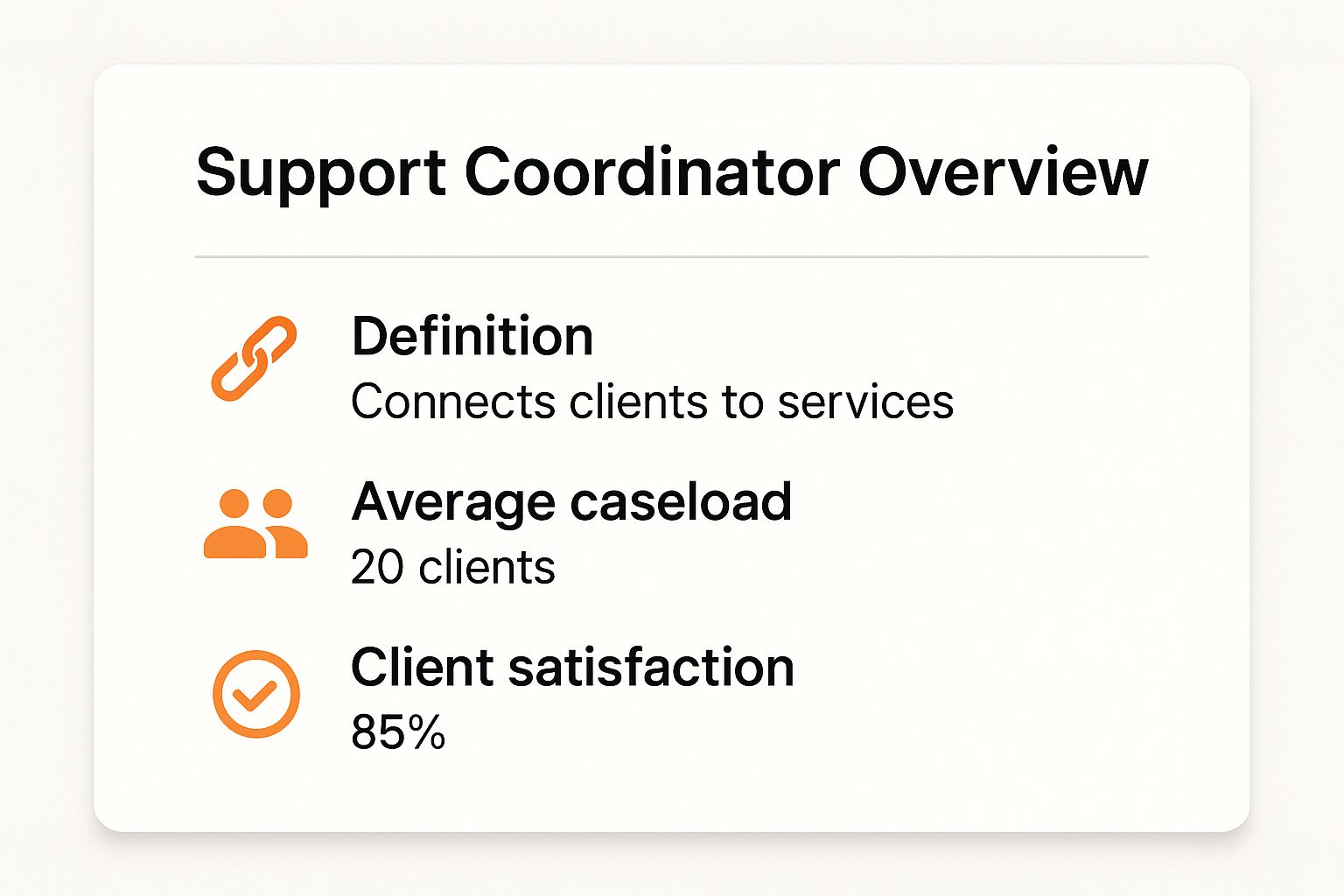What Is a Support Coordinator? Your NDIS Guide
If you've ever felt overwhelmed looking at your NDIS plan, you're not alone. Think of a support coordinator as your personal project manager for your NDIS journey. Their main job is to help you make sense of your plan, use your funding effectively, and connect you with the right supports to live the life you want.
They aren't there to make decisions for you. Instead, they act as your guide, empowering you with the knowledge and resources to make your own informed choices.
What a Support Coordinator Actually Does
Let's use an analogy. Imagine your NDIS plan is a detailed blueprint for building your ideal life. It shows what's possible. The support coordinator is the expert builder who helps you read that blueprint, finds the best tradespeople (like therapists or community groups), and makes sure everything stays on track.
This role became a crucial part of the National Disability Insurance Scheme (NDIS) after its full rollout in 2020. It’s no surprise that today, almost 50% of all NDIS participants rely on a support coordinator to help navigate their plans.
Your Strategic Partner in the NDIS Journey
A good support coordinator does much more than just connect you with services. They become a strategic partner, focusing on three key things:
- Understanding Your Plan: They'll sit down with you and break down the often-confusing NDIS jargon. They translate funding categories into real-world possibilities, showing you exactly how your budget can work for you.
- Connecting to Services: Using their extensive network and local knowledge, they find and vet high-quality service providers—from OTs and support workers to social groups—that are the best fit for your unique needs and personality.
- Building Your Skills: The ultimate goal is to build your own capacity. A great coordinator teaches you the ropes, helping you grow in confidence so you can eventually manage your own plan and advocate for yourself.

To make it even clearer, here’s a quick summary of the key responsibilities a support coordinator takes on.
Key Responsibilities of a Support Coordinator at a Glance
| Responsibility Area | What This Means for You |
|---|---|
| Plan Implementation | Helping you start using your NDIS plan and its allocated funds. |
| Service Connection | Finding and connecting you with the right providers for your specific goals. |
| Capacity Building | Teaching you the skills to manage your plan independently over time. |
| Crisis Management | Providing support and solutions if you face unexpected challenges. |
| Reporting to NDIS | Helping prepare reports for your plan reviews to show how your funding is helping. |
Ultimately, a support coordinator is there to ensure your NDIS plan doesn't just sit on a shelf. They help turn it into a powerful tool for achieving your goals.
With high client satisfaction rates across the board, support coordinators have proven to be an invaluable part of the NDIS ecosystem. For a more detailed look, check out our comprehensive guide on what is support coordination.
Bringing Your NDIS Plan to Life

So, you have your NDIS plan. It’s a document full of goals and approved funding, but how do you actually make it all happen? That’s where a support coordinator steps in. Think of them as the project manager for your NDIS journey, turning the words on the page into real, practical support that makes a difference in your day-to-day life.
One of their main jobs is to connect you with the right people and services. This isn't just about finding NDIS-registered providers. A truly great coordinator has an extensive network and understands the value of mainstream and community supports, like local clubs, health services, or council programs. Tapping into these can enrich your life, often without even touching your NDIS budget.
Imagine your goal is to get more involved in your community. Your coordinator might help you find a disability sports team (using your NDIS funds) and help you sign up for the local library's book club (a free mainstream service). It’s about building a complete support system around you.
Securing the Best Value for You
Navigating service agreements and quotes can be daunting, but this is another area where your coordinator shines. They act as your advocate, negotiating with providers to make sure you’re getting the best possible value and that the services offered are a perfect match for your needs. They'll pour over the fine print so you don't have to.
A great support coordinator doesn’t just do things for you; they do them with you. The goal is always to build your own confidence and skills, explaining the 'why' behind each step so you feel more empowered to manage your plan over time.
This means they’ll break down confusing quotes, question anything that isn't crystal clear, and ensure all agreements are fair and in your best interest. This removes a massive amount of stress and admin work from your plate, freeing you up to focus on what really matters—your goals.
Preparing for the Future
Perhaps one of the most vital roles a support coordinator plays is getting you ready for your next plan review. This isn't a mad dash a week before the meeting. Instead, it’s a continuous process of collecting evidence and reports from your providers throughout the year.
This proactive work demonstrates exactly how your funding has helped you progress towards your goals. When the review comes around, you’ll have a powerful collection of evidence showing the NDIA what's worked, what hasn't, and what you need for the year ahead. This makes it much easier to justify your future funding needs.
Finding the right professional to walk with you through these steps is crucial. If you’re looking for expert guidance, exploring options for support coordination in Adelaide is an excellent place to start.
The Real Benefits of Having a Support Coordinator

It’s one thing to understand the role of a support coordinator on paper, but it's another thing entirely to see the real-world difference they make. The biggest benefit? They turn your NDIS plan from a document that can feel confusing and overwhelming into a practical roadmap for your life. They’re there to make sure every dollar in your budget works as hard as it can for you.
For many people and their families, trying to manage an NDIS plan can feel like taking on a second job. A support coordinator shoulders that administrative weight, freeing up precious time and mental energy. That means less stress buried in paperwork and more time focused on living your life and reaching your goals.
The true value of a support coordinator lies in turning an overwhelming process into an empowering journey. They provide the clarity and confidence you need to advocate for yourself and focus on what truly matters.
This shift from being stressed out to feeling empowered is probably the most profound benefit. You suddenly have an expert partner who is completely in your corner, making sure your voice is heard and your needs are met.
Maximising Your Plan and Network
A really good support coordinator does more than just tick boxes and manage your existing plan; they help you get every last drop of value out of it. They have an insider’s knowledge of the disability services market and can often pinpoint high-quality, value-for-money services you might never find on your own.
Think about it this way: say you need a specific type of therapy. Instead of you spending hours scrolling through search results and making endless calls, your coordinator can immediately tap into their professional network. They can connect you with trusted providers who already have a great track record with people whose needs are similar to yours.
This expert connection brings a few key advantages:
- Saving Time and Effort: You get to skip the frustrating trial-and-error phase of finding the right provider.
- Building a Strong Support Team: They help you assemble a team of professionals who actually talk to each other and work together for your benefit.
- Uncovering Hidden Opportunities: Coordinators are often the first to know about new programs, local groups, or community activities that can add incredible value alongside your formal NDIS supports.
At the end of the day, they become the glue that holds your entire support network together. They make sure everyone is on the same page and all your services are working in harmony to help you achieve what you want.
If you're looking for more practical advice, our collection of Helpful NDIS Guides & Resources is a great place to continue learning.
How to Get Support Coordination in Your Plan
Getting funding for a support coordinator in your NDIS plan is a common goal, but it isn't automatic. The National Disability Insurance Agency (NDIA) needs to see it as ‘reasonable and necessary’ for your specific situation. This means you need to clearly show them why this support is essential for you to actually use your plan.
Think of it like building a case for yourself. The NDIA is much more likely to approve funding if they see a clear need. For instance, if this is your first NDIS plan and you don't have many family or friends who can help you navigate it all, a coordinator can be a vital link.
The key is to connect the dots for the planner. You need to demonstrate that without a support coordinator on your team, you'd find it incredibly difficult to connect with the right services and put your NDIS funding to good use.
This logic also holds true for participants with really complex support needs—maybe you're juggling multiple therapists, support workers, and other providers. People going through a significant life change or a crisis, like a sudden move or a health decline, are also strong candidates for getting this support funded.
How to Justify Your Request
When you head into your planning meeting, being prepared makes all the difference. It's not enough to just say, "I need a support coordinator." You need to explain why you need one, linking it directly back to your disability, your goals, and your life.
Here are a few practical points you can raise to build your case:
- Explain Your Barriers: Talk about the specific things that make it hard for you to manage your plan. Do you struggle with researching providers, understanding service agreements, or making phone calls? Be specific.
- Highlight Complexity: If you have several health conditions or need a wide range of different supports, point this out. Explain that you need help to make sure all those services work together smoothly.
- Show Your Goals: Connect the coordinator’s role directly to achieving what you want to do. For example, "I need a coordinator to help me find an occupational therapist who can help me with my goal of cooking independently."
Providing this kind of clear justification is your best bet. If you want to get a better idea of the paperwork that can help, you can learn about the forms and templates we use to help our clients get organised and ready for their planning meetings.
Choosing the Right Support Coordinator for You

The relationship you build with your support coordinator is one of the most critical parts of your entire NDIS journey. It’s a partnership based on trust, open communication, and a shared understanding of what you want to achieve. Finding the right person isn't just a nice-to-have; it's essential for bringing your NDIS plan to life.
Think of it as hiring the captain for your support team. You need someone who not only has the right skills and knowledge but who also genuinely listens, respects your decisions, and communicates in a way that works for you. This connection is what will turn the goals on paper into real-world progress.
Key Questions to Ask
Before you commit, it’s always a good idea to chat with a few different coordinators. This is your chance to get a feel for their personality and their way of working, ensuring you find the best possible match.
Here are a few crucial questions to guide that conversation:
- Experience: "Could you tell me about your experience working with people who have goals or needs similar to mine?"
- Local Knowledge: "How well do you know the local services and community groups in my area?"
- Communication Style: "How often can I expect to hear from you, and what’s the best way to get in touch if I need something?"
- Problem-Solving: "Can you share an example of a tricky situation you helped another participant work through?"
A great support coordinator doesn’t see you as just another plan to manage. They see you as a person and are genuinely invested in helping you build the life you want.
Their professional background can also tell you a lot. Here in Australia, over 70% of advertised positions for support coordinators list hands-on experience with people with disabilities as a must-have. Many also hold qualifications in areas like social work or community services, so you know they have a solid foundation of expertise. For a deeper dive, you can explore the professional standards for support coordinators to see what a quality service looks like.
Common Questions About Support Coordination
When you're trying to get your head around the NDIS, it’s completely normal for questions to pop up. Let’s tackle a few of the most common ones we hear about support coordination so you can feel more confident navigating the system.
Support Coordinator vs Plan Manager
It’s one of the most frequent points of confusion, but these two roles are worlds apart. They're both here to help, but they handle completely different parts of your NDIS journey.
Think of your Support Coordinator as your personal NDIS strategist. They're on the ground with you, helping you understand your plan, find the right providers, and connect all the dots to bring your goals to life. A Plan Manager, on the other hand, is your financial whiz. They work behind the scenes, managing the money side of things—paying invoices and keeping track of your budget.
Essentially, a Support Coordinator helps you decide what to do with your funding to build a better life, while a Plan Manager handles the financial admin to pay for it all.
The good news is you don’t have to choose. Many people have both to make sure every aspect of their plan runs smoothly.
Can I Change My Support Coordinator?
Yes, you absolutely can. Choice and control are at the heart of the NDIS, and that power is always in your hands.
If your relationship with your support coordinator doesn’t feel right, or they just don't seem to "get" what you're trying to achieve, you have every right to find someone who does. A strong, trusting partnership is the foundation of good support coordination, so feeling comfortable and understood is non-negotiable.
Sometimes, hearing from others can really put things into perspective. We've gathered a collection of client stories and experiences that show just how much of a difference the right support partnership can make.
Does This Funding Affect My Other Budgets?
This is a big one, and the answer is a clear no. Funding for support coordination is a separate, dedicated budget item in your NDIS plan.
It does not take away from the funds you have allocated for your other supports, whether that’s for therapy, new assistive technology, or help with daily activities. The NDIA includes this funding because they know that getting the right help to put your plan into action is crucial. It’s an investment in you, ensuring you can make the most of every dollar in your plan.
At Navigator In Reach, our whole focus is on providing clear, practical support coordination. We're here to cut through the jargon and empower you to build a network of supports that truly makes a difference. Get in touch with us today and let's get started.
